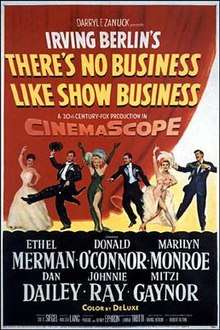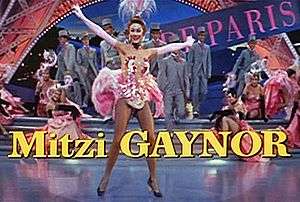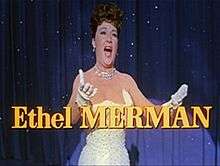There's No Business Like Show Business (film)
| Irving Berlin's There's No Business Like Show Business | |
|---|---|
 Theatrical release poster | |
| Directed by | Walter Lang |
| Produced by | Sol C. Siegel |
| Screenplay by |
Phoebe Ephron Henry Ephron |
| Story by | Lamar Trotti |
| Starring |
Ethel Merman Donald O'Connor Marilyn Monroe Dan Dailey Johnnie Ray Mitzi Gaynor |
| Music by | Irving Berlin (songs) |
| Cinematography | Leon Shamroy |
| Edited by | Robert L. Simpson |
| Distributed by | 20th Century Fox |
Release date | December 16, 1954 |
Running time | 117 minutes |
| Country | United States |
| Language | English |
| Budget | $4,340,000[1] |
| Box office | $5,103,555[2] |
Irving Berlin's There's No Business Like Show Business is a 1954 20th Century-Fox DeLuxe Color musical-comedy-drama in CinemaScope, directed by Walter Lang. It stars an ensemble cast, consisting of Ethel Merman, Dan Dailey, Donald O'Connor, Mitzi Gaynor, Marilyn Monroe, Johnnie Ray, and Richard Eastham.
The title is borrowed from the famous song in the stage musical (and MGM film) Annie Get Your Gun. The screenplay was written by Phoebe Ephron and Henry Ephron, based on a story by Lamar Trotti;[3] and the movie was Fox's first musical in CinemaScope and DeLuxe Color.[4]
Donald O'Connor later called the film the best picture he ever made.[5]
Plot
In 1919, Terence Donahue and his wife Molly are a husband-and-wife vaudeville team known as the Donahues, pursue both a stable family life as well as professional success. Their children, Steve, Katy, and Tim, join the act one by one, and their act eventually becomes the Five Donahues. The family is a success and soon hit the top.
One night after a show, a worried Molly and Terry return home alone while Katy goes out on a date, Steve takes a walk, and the womanizing Tim goes out with an older chorus girl. Katy and Tim both wind up at a nightclub where Tim teases Victoria Hoffman. Vicky forgets Tim's wisecracks, however, when Eddie Dugan, her agent, informs her that he has persuaded famed producer, Lew Harris, to visit the club. With the help of her co-workers, Vicky gets onstage and impresses Lew and Tim with her singing. Backstage, Vicky learns that Tim is one of the well known Donahues but quickly dismisses him in order to talk business with Harris.

Back at the Donahue home, Steve informs his family that he wants to become a priest. Terry is distraught over his son's decision, but their discussion is interrupted by the appearance of Tim, who got drunk after he was dismissed by Vicky.
After Steve leaves for seminary school, the rechristened Four Donahues accept an engagement in Miami. Upon arrival, Tim is thrilled to find that Hoffman, now known as Vicky Parker, is also appearing there; however she is performing a considerably more sensual version of Heat Wave, the same number as the family. After falling in complete lust with Vicky's performance at rehearsal, Tim gives his approval for her to perform the number without checking with the family beforehand.
Katy begins dating Charlie Gibbs, the show's tall and spare lyricist, and Tim continues dating Vicky. After a misunderstanding over a broken dinner date with Vicky, Tim goes out drinking with a chorus girl and gets in a car accident. Molly and Terry learn of the accident just hours before opening night of the show for which he, Vicky and Katy have been rehearsing, and Terry goes down to the hospital to confront Tim about his conduct. Tim rebuffs the advice, whereupon Terry slaps him across the face and storms out. The next day, Terry and Molly go back to the hospital to pick up Tim but discover that he has vanished, leaving behind a note apologizing for his behavior. Molly and Terry are both heartbroken but decide to take action.
Molly convinces Lew that, while she'd have to fake the dancing, a feat with which she's been getting away for years, she can go on in Tim's place, having been at rehearsal every night for months. Steve has been called up into the Army as a chaplain and been sent to Europe where his whereabouts are also unknown. Weeks later, the show is a resounding success, but Terry is still despondent over the loss of Tim. After dropping Molly off at the theatre to perform that night, he disappears on the road in a quest for his son, which understandably devastates a very high-strung Molly, having all three of the men in her life with their whereabounts now unknown.

Months later at a benefit show for the closing night of the famed Hippodrome Theatre in New York, Katy, who has since become close friends with Vicky, arranges for her to share a dressing room with her mother to teach her a very well-deserved lesson. Seeing through her daughter's manipulation and highly annoyed therewith, Molly begins to pack up and head upstairs for some peace and quiet, however, Katy not only tells her mother that she'll be doing nothing of the kind, but that she needs to apologize to Vicky for snubbing her at every turn for the past year. Highly incensed at the very idea, she demands to know why, and Katy calmly tells her that what happened to Tim, he brought it on all by himself. Seeing the truth about her youngest son, Molly relents and has a long talk with Vicky, who assures her that she never did play around on Tim and that she's loved him all along. They make up and Vicky takes her place backstage. Steve comes in unexpectedly, they share a hug, and Molly admits that she was pretty hardheaded too and never gave Vicky the proper chance she deserved.
As Molly performs the title song, Steve and Katy watch from the wings; then Tim, wearing a US Navy uniform, appears behind them. Thrilled to be reunited, the Five Donahues, with Vicky holding tightly onto Tim's hand, all go onstage and happily reprise a short encore of their version of "Alexander's Ragtime Band" before reprising with a finale of the title song.
Cast
Starring (in credits order)
- Ethel Merman as Molly Donahue
- Donald O'Connor as Tim Donahue
- Marilyn Monroe as Victoria Hoffman
- Dan Dailey as Terence Donahue
- Johnnie Ray as Steve Donahue
- Mitzi Gaynor as Katy Donahue
Featured players
- Richard Eastham as Lew Harris
- Hugh O'Brian as Charles Gibbs
- Frank McHugh as Eddie Dugan
- Rhys Williams as Father Dineen
- Lee Patrick as Marge
- Eve Miller as Hatcheck Girl
- Robin Raymond as Lilliam Sawyer
Soundtrack
All songs written by Irving Berlin.[6]
| Song | Performer(s)[7] | Note(s) |
|---|---|---|
| "When the Midnight Choo-Choo Leaves for Alabam'" | Sung by Ethel Merman and Dan Dailey | Later performed by Mitzi Gaynor and Donald O'Connor |
| "Play a Simple Melody" | Sung by Ethel Merman and Dan Dailey | - |
| "A Pretty Girl Is Like a Melody" | Sung by Ethel Merman with Dan Dailey Danced by Dan Dailey |
- |
| "You'd Be Surprised" | Dan Dailey | - |
| "Let's Have Another Cup of Coffee" | Sung by Ethel Merman | - |
| "Alexander's Ragtime Band" | The cast | Later sung by Ethel Merman, Dan Dailey, Donald O'Connor, Mitzi Gaynor and Johnnie Ray |
| "Puttin' on the Ritz" | - | Instrumental performed by the nightclub orchestra |
| "After You Get What You Want You Don't Want It" | Marilyn Monroe | - |
| "Remember" | Sung by the cast | Later sung by Ethel Merman and Dan Dailey |
| "If You Believe" | Sung by Johnnie Ray | - |
| "Heat Wave" | Marilyn Monroe | - |
| "A Man Chases a Girl (Until She Catches Him)" | Sung by Donald O'Connor and Marilyn Monroe Danced by Donald O'Connor |
- |
| "Lazy" | Marilyn Monroe, Mitzi Gaynor and Donald O'Connor | - |
| "A Sailor's Not a Sailor ('Til a Sailor's Been Tattooed)" | Sung by Ethel Merman and Mitzi Gaynor | - |
| "Marie" | Performed by an uncredited male trio on a nightclub's stage when the family is searching for Tim | - |
| "There's No Business Like Show Business" | Ethel Merman | Later sung by the cast |
Production
In the months prior to the filming of the movie, Marilyn Monroe had been placed on suspension from 20th Century-Fox after refusing to accept the leading role in a film version of The Girl in Pink Tights. During her suspension, she married baseball star Joe DiMaggio and the two honeymooned in Japan, during which she took time to entertain soldiers in Korea. Fox had intended on casting Sheree North in the picture, going so far as to test the actress in Monroe's own studio wardrobe. When the star returned to Hollywood, her Fox suspension was lifted, and studio executives offered her a role in the ensemble cast of There's No Business Like Show Business as a replacement project for having refused to make Pink Tights. Monroe initially refused to make the picture just as she had for the previous offering until Fox ensured her that her next vehicle would be The Seven Year Itch.[8]
Ethel Merman had first sung "There's No Business Like Show Business" in the original Broadway production of Annie Get Your Gun in 1946 and would go on to sing it again in the 1967 television broadcast of the subsequent Lincoln Center revival.[9]
Release and reception
To publicize the film, Monroe wore a black cotton polka-dot swimsuit. It went on auction at Christie's in London in 1991 and sold for $22,400 to collector David Gainsborough Roberts.[10]
Despite boasting a lavish production, There's No Business Like Show Business eventually became both a critical and box office failure.
Ed Sullivan described Monroe's performance of the song "Heat Wave" as "one of the most flagrant violations of good taste" he had witnessed.[11] Time magazine compared her unfavorably to co-star Ethel Merman. Bosley Crowther in The New York Times called the film a "major success" in a generally favorable review, praising in particular Donald O'Connor's performance, but said that Mitzi Gaynor had surpassed Monroe's "wriggling and squirming" which were "embarrassing to behold."[12] Donald O'Connor drew unfavorable reviews for his "over-acting" and "uncanny flirting" with Monroe on-screen. Dan Dailey and Johnnie Ray favored better among critics, although reviewers stated their performances were "below average".
The film's budget was $4,340,000.[1] Excessive at the time for a movie filmed entirely on a studio lot in Los Angeles, the expenses were mainly due to delays in production, the lavish musical numbers and a running time that was at least 15 minutes longer than most other Hollywood musicals. Because the film made just $5,103,555 at the box office,[2] and became the thirteenth highest-grossing film of 1954, 20th Century Fox officials were disappointed.
According to records, Fox was expecting a profit of $2 million, but ran a loss of almost $950,000. It is also significant that Johnnie Ray never worked again for 20th Century Fox or appeared in another motion picture made by any major movie studio in the United States or another country, though his music developed a stronger following overseas than in the United States.
Broadcasts on local television stations in the 1970s and 1980s were unkind to the legacy of There's No Business Like Show Business because it warranted a time slot of at least three hours including commercials and because of the lack of letterboxing during that era. Its release to the home video market in the early 1990s, which solved the problem of commercial interruptions though the issue of the aspect ratio of Cinemascope remained, improved its profits considerably. A DVD release in 2001 that included letterboxing introduced the film to younger generations. It has received favorable reviews from critics and fans.
Awards and honors
| Date of ceremony | Award | Category | Recipients and nominees | Result |
|---|---|---|---|---|
| February 25, 1954[13] | Writers Guild of America Awards | Best Written Musical | Phoebe Ephron, Henry Ephron | Nominated |
| Best Original Score - Musical | Alfred Newman, Lionel Newman | Nominated | ||
| Best Story | Lamar Trotti (posthumous nomination) | Nominated | ||
| Best Costume Design – Color | Charles LeMaire, Travilla, Miles White | Nominated | ||
The film is recognized by American Film Institute in these lists:
- 2006: AFI's Greatest Movie Musicals – Nominated[15]
References
- 1 2 Solomon, Aubrey (2002). Twentieth Century Fox: A Corporate and Financial History. The Scarecrow Filmmakers Series. 20. Lanham, Maryland: Scarecrow Press. p. 248. ISBN 9780810842441. Retrieved November 6, 2014.
- 1 2 'The Top Box-Office Hits of 1955', Variety Weekly, January 25, 1956
- ↑ "There's No Business Like Show Business (1954): Full Cast & Crew - Writing Credits". IMDb. Amazon.com. Retrieved November 6, 2014.
- ↑ "There's No Business Like Show Business (1954): Overview - Synopsis". AllMovie. All Media Network. Retrieved November 6, 2014.
- ↑ http://danceviewtimes.com/dvny/features/2003/o'connor.html
- ↑ "There's No Business Like Show Business (1954): Soundtracks". IMDb. Retrieved November 7, 2014.
- ↑ Vogel, Michelle (2014). Marilyn Monroe: Her Films, Her Life. McFarland. p. 105.
- ↑ "There's No Business Like Show Business (1954):Trivia #4". IMDb. Amazon.com. Retrieved November 6, 2014.
- ↑ "There's No Business Like Show Business (1954):Trivia #7". IMDb. Amazon.com. Retrieved November 6, 2014.
- ↑ The Hollywood Reporter. 317. Indiana University: Wilkerson Daily Corporation. 1991. p. 3. Retrieved November 6, 2014.
- ↑ Harding, Les (2012). They Knew Marilyn Monroe: Famous Persons in the Life of the Hollywood Icon. Jefferson, North Carolina: McFarland & Company. p. 146. ISBN 9780786466375. Retrieved November 6, 2014.
- ↑ Crowther, Bosley (December 17, 1954). "There s No Business Like Show Business (1954): There's No Business,' Etc.; And Musical at the Roxy Sets Out to Prove It". The New York Times. New York, New York: New York Media. Retrieved November 6, 2014.
- ↑ "Writers Guild of America, USA: Awards for 1955 - Best Written American Musical: Nominees". IMDb. Retrieved November 11, 2014.
- ↑ "Oscars Ceremonies: The 27th Academy Awards - 1955: Winners & Nominees". Oscars. Retrieved November 11, 2014.
- ↑ "AFI's Greatest Movie Musicals Nominees" (PDF). Retrieved 2016-08-13.
External links
| Wikimedia Commons has media related to There's No Business Like Show Business (film). |